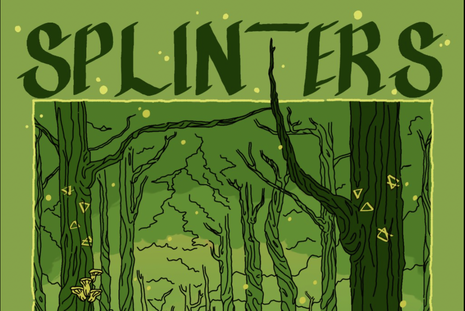Splinters misses a critical roll
Tom Howlett reviews the Dungeons-and-Dragons-inspired musical playing at Robinson College Auditorium

Splinters is an original musical written, directed and composed by Katrina Rose. This story, based on the popular roleplaying game Dungeons and Dragons, is a labour of love from start to finish. There is a tenderness in the amount of effort and passion that has gone into making this production, which sadly only makes its failures all the more disappointing.
The plot of Splinters is weak. The story of a magical young girl who meets a ragtag group of adventurers, each with their own quirky personalities, is bereft of substance, barely providing more depth than a synopsis. The stakes of the narrative hinge upon the characters’ love for the setting, the magical Forest, but the audience are unable to share in that love. There are no moments admiring its beauty and no discussion of its ecology or personality. With a magical setting, there is incredible scope to experiment and explore without being fettered to the real world, and in Splinters, this is sadly ignored.
“The musical performances were far stronger than the dialogue”
The production elements were the highlight of the show. The set design by Chloe Stark was lovingly crafted; it hinted at the beauty of the forest which, unfortunately, was never explored in the script. The costume design was excellent, immediately placing you in the environment of the show and tailored for each character’s individual archetype. The most impressive work, however, was by the lighting designers Sophie Howarth, Kit Treadwell, and George Jones. Given the unenviable task of bringing magic to the stage, they rose to it masterfully. A particularly standout moment comes when the cast teleport and a light shines out into the audience like the beam from a lighthouse, quickly raking across the stalls, providing both a feeling of movement and the disorientation of a new environment.
The band added lively energy which dictated the pace of the performance. The musical performances were far stronger than the dialogue, and the quality of each individual performer was only slightly marred by the jarring dissonance they had when put together. Arel (Harriet Edwards), the protagonist, gave a particularly wonderful musical performance, elevating her character beyond the limitations of the script. The songs brought some of the campy energy that I was expecting from the rest of the production, and there was a clear creative vision in their direction. The choreography during these musical numbers, however, was awkward, with characters shuffling on stage seemingly unsure where to look or move. I could hear the energy and vitality in the songs as they were being performed, but all I saw on stage was maladroit movement.

Splinters’s script moves as if it were on a conveyor belt: directly towards a climax with no hiccups, twists, or turns. The script follows traditional story structures so rigidly that you could set your watch by each narrative beat. The formulaic structure makes you feel as though you are watching a writer tick boxes rather than tell an organically evolving story: a misunderstood protagonist more powerful than anyone else, tick, bullied at school, tick, can’t control her power, tick.
“The production elements were not enough to distract from the weakness of this production”
This box-ticking approach is particularly noticeable in the characterisation. Whilst watching Splinters, I could only see the characters as chess pieces. They were each defined by their title – in this case bard, rogue, and healer – and were moved towards a pre-defined conclusion by an off-stage hand. There is an attempt to give depth to some characters with the addition of tragic backstories and unrequited loves, but each of these is handled slightly clumsily. As an audience, it’s hard to care about the forest, understand the magic, or relate to the characters, so there is no point of entry to enjoy the story aside from a vague appreciation of the effort that must have gone into its creation.
The performers, although working with limited resources, seemed lacking in confidence during this performance, unable to add the necessary nuance to their characters. Some mention should go to Macsen Llewelyn who was able to add some dimension to the character of Tirona and gave the most successful performance of the night.
The production elements, however impressive, were not enough to distract from the weakness of this production. There is a fundamental problem that Splinters had to solve after its inception: how to turn an active game like Dungeons and Dragons, one that is enjoyable because of how you, as an individual, can interact with and change it, into a passive story, one that you can enjoy as an outside observer with no individual agency. Splinters doesn’t have the depth of content to function as a straight play, it lacks the cohesive musical identity needed to function as a musical, and it is not interactive enough to work as a Dungeons and Dragons narrative. Unfortunately, it cannot overcome the starting obstacles to provide an enjoyable experience for the audience.
Splinters is playing at Robinson College Auditorium until Saturday 26th February.
 Interviews / You don’t need to peak at Cambridge, says Robin Harding31 December 2025
Interviews / You don’t need to peak at Cambridge, says Robin Harding31 December 2025 News / Unions protest handling of redundancies at Epidemiology Unit30 December 2025
News / Unions protest handling of redundancies at Epidemiology Unit30 December 2025 Comment / What happened to men at Cambridge?31 December 2025
Comment / What happened to men at Cambridge?31 December 2025 Features / ‘Treated like we’re incompetent’: ents officers on college micromanagement30 December 2025
Features / ‘Treated like we’re incompetent’: ents officers on college micromanagement30 December 2025 Theatre / We should be filming ADC productions31 December 2025
Theatre / We should be filming ADC productions31 December 2025








